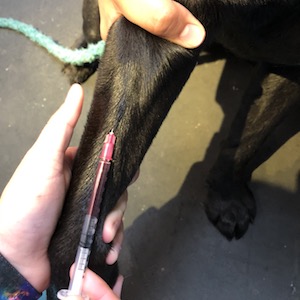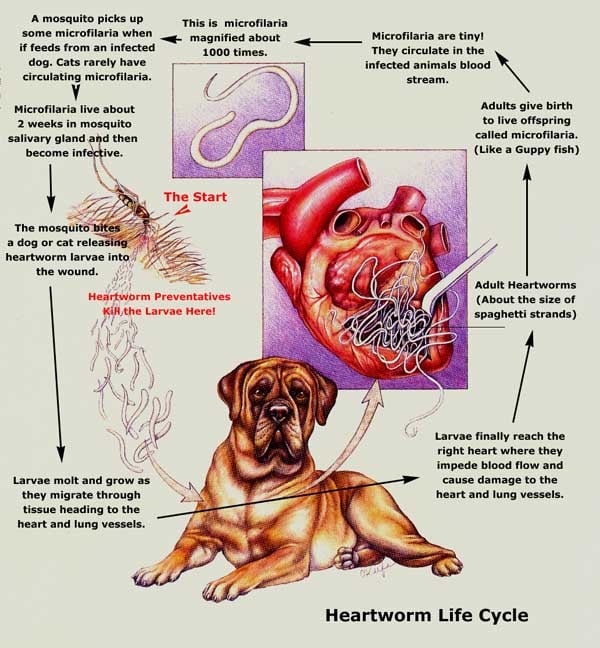Once a dog has been successfully treated for heartworms, their lifespan should not be significantly affected as long as they receive proper care and ongoing preventative measures. However, if left untreated, heartworm disease will progress and damage the dog’s heart, lungs, liver, and kidneys, eventually causing death.
The lifespan of a dog with untreated heartworm disease is most likely limited to a few weeks or a few months. It is crucial to consult with a veterinarian to determine the best course of action for treating your dog depending on the severity of their infection.
With appropriate treatment and ongoing care, dogs can live for at least six to seven months after becoming infected with heartworms.

Credit: www.heartwormsociety.org
Understanding Heartworms In Dogs
The survival rate for dogs with heartworms depends on various factors such as the dog’s size, overall health, and response to treatment. With proper care and ongoing preventative measures, dogs can live a long and healthy life after successful heartworm treatment.
Untreated heartworm disease can progress and cause organ damage, eventually leading to death.
What Is Heartworm Disease?
Heartworm disease is a serious and potentially fatal condition that affects dogs. It is caused by the presence of parasitic worms, specifically Dirofilaria immitis, in the heart, lungs, and blood vessels of an infected canine. These worms are transmitted through the bite of an infected mosquito, which introduces the larvae into the dog’s bloodstream. Over time, these larvae mature into adult worms, causing damage to the heart and other vital organs.Progression Of Heartworm Disease
The progression of heartworm disease can be divided into several stages. In the early stages, dogs may not show any noticeable symptoms, making it difficult to detect the presence of heartworms. As the disease progresses, dogs may start experiencing coughing, fatigue, decreased appetite, and weight loss. In severe cases, dogs can develop a condition called caval syndrome, which is characterized by complete organ failure. Sadly, dogs at this stage have a poor prognosis and may not survive without immediate treatment.Effects Of Untreated Heartworms
If left untreated, heartworm disease can have devastating effects on a dog’s health. Over time, the worms can cause damage to the arteries, lungs, heart, liver, and kidneys. This damage can lead to pulmonary hypertension, heart failure, and other life-threatening complications. Additionally, the presence of adult worms in the heart can obstruct blood flow, leading to further organ damage. Ultimately, untreated heartworms can significantly decrease a dog’s lifespan and eventually cause death. In conclusion, heartworm disease is a serious condition that can have severe consequences if left untreated. Understanding the progression of the disease and its effects on a dog’s health is crucial in ensuring early detection and prompt treatment. Regular heartworm prevention and annual testing are essential to safeguard your dog’s well-being and prolong their lifespan.
Credit: www.heartwormsociety.org
Treatment And Survival
Once a dog has been successfully treated for heartworms, their lifespan should not be significantly affected as long as they receive proper care and ongoing preventative measures. However, if left untreated, heartworm disease will progress and damage the dog’s organs, eventually causing death.
When it comes to heartworm disease in dogs, treatment and survival are crucial factors to consider. After a dog has been successfully treated for heartworms, their lifespan should not be significantly affected as long as they receive proper care and ongoing preventative measures. However, it is important to understand various factors that impact the survival rate of dogs with heartworm disease and the role of preventive measures in ensuring a long and healthy life for our furry friends.
Can Dogs Live A Long Life After Heartworm Treatment?
Once a dog has been successfully treated for heartworms, they can live a long and fulfilling life. While heartworm treatment can be challenging and may have side effects, the overall outcome is positive if the dog receives appropriate care during and after treatment. To maximize their chances of a long life, it is crucial to follow the veterinarian’s instructions regarding medication, exercise restrictions, and regular check-ups. Dogs that complete treatment and adhere to preventive measures can lead happy, healthy lives.
Factors Impacting Survival Rate
Several factors can impact the survival rate of dogs with heartworm disease. These include:
- The stage of heartworm infection: Dogs with advanced stages, such as class four or caval syndrome, have a lower survival rate. In these cases, organ failure may occur.
- The overall health of the dog: Dogs with underlying health conditions may be more susceptible to complications during treatment.
- Adherence to treatment protocol: Following the treatment protocol precisely, including restricted exercise and regular medication, is crucial for successful outcomes.
- Veterinary care and monitoring: Regular check-ups, diagnostic testing, and follow-up appointments with the veterinarian help ensure the dog’s progress and make necessary adjustments to the treatment plan.
The Role Of Preventive Measures
Preventing heartworm disease is vital to ensure the long-term health and survival of dogs. Implementing preventive measures, such as regular heartworm medication, can significantly reduce the risk of heartworm infection. Moreover, annual heartworm testing allows for early detection and timely treatment if needed. Keeping dogs on preventive medication throughout their lives is key to safeguarding them from this potentially life-threatening disease.
Prognosis And Life Expectancy
Without treatment, the lifespan of a dog with heartworms can be limited to a few weeks or months. However, with proper care and ongoing preventative measures, a dog can live a long life after heartworm treatment. It is important to seek guidance from a veterinarian based on the severity of the infection.
Life Expectancy For Dogs With Untreated Heartworms
If left untreated, heartworm disease can be fatal for dogs. The progressive damage to the heart, lungs, liver, and kidneys can ultimately lead to the death of the dog. Not all dogs with heartworm disease develop caval syndrome, which is the advanced stage characterized by complete organ failure. However, for those who do reach stage four heartworm infection, the prognosis is typically bleak. Unfortunately, most dogs with caval syndrome do not survive.
The Last Stages Of Heartworms
Stage four heartworm infection, also known as caval syndrome, is the final stage of heartworm disease. At this stage, the dog experiences complete organ failure. The heart and pulmonary arteries become severely clogged with adult heartworms, obstructing the blood flow and causing significant damage. Dogs in this stage often suffer from severe respiratory distress, shock, and multiple organ failure. Unfortunately, most dogs with stage four heartworm infection do not survive.
Lifespan Of Dogs With Heartworms After Treatment
Once a dog has been successfully treated for heartworms, their lifespan should not be significantly affected as long as they receive proper care and ongoing preventative measures. It is important to continue administering monthly heartworm preventatives to prevent re-infection. Dogs that have undergone heartworm treatment can live for at least six to seven months after becoming infected with heartworms.
It is crucial to consult with a veterinarian for guidance on the best course of action for treating your dog depending on the severity of their heartworm infection. Early detection and prompt treatment increase the chances of a successful outcome and a longer lifespan for your beloved pet.

Credit: mcphillipsanimalhospital.com
Frequently Asked Questions For My Dog Has Heartworms How Long Will She Live
What Is The Survival Rate For Dogs With Heartworms?
Once a dog has been successfully treated for heartworms, their survival rate is not significantly affected as long as they receive proper care and ongoing preventative measures. Survival rate depends on the size and health of the dog, as well as any reactions to the treatment.
Can Dogs Live A Long Life After Heartworm Treatment?
Dogs can live a long life after heartworm treatment with proper care and ongoing preventative measures. Heartworms, if left untreated, can progress and cause organ failure, leading to death. However, with treatment, a dog’s lifespan should not be significantly affected.
What Are The Last Stages Of Heartworms?
Once a dog reaches the last stages of heartworms, known as class four or caval syndrome, they suffer from complete organ failure. Unfortunately, most dogs in this stage will pass away. Without treatment, heartworm disease will progress, damaging the dog’s heart, lungs, liver, and kidneys, eventually leading to death.
However, with proper care and ongoing preventative measures after treatment, a dog’s lifespan should not be significantly affected.
What Happens To Dogs With Untreated Heartworms?
If left untreated, heartworm disease will progress and damage a dog’s heart, lungs, liver, and kidneys, eventually causing death.
Conclusion
Once a dog has been successfully treated for heartworms, their lifespan should not be significantly affected as long as they receive proper care and ongoing preventative measures. It is important to work closely with your vet to develop a treatment plan and ensure your dog’s overall health.
Remember, early detection and regular check-ups are key for the well-being and longevity of your furry friend. By taking the necessary steps, you can help your dog continue to live a happy and healthy life.



